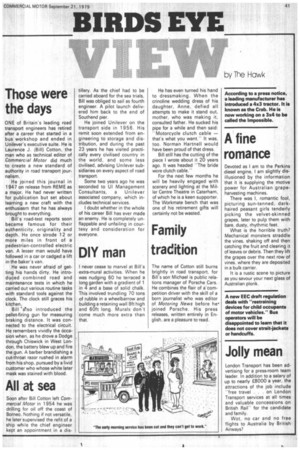Those were the days
Page 43

If you've noticed an error in this article please click here to report it so we can fix it.
ONE of Britain's leading road transport engineers has retired after a career that started in a bus workshop and ended in Unilever's executive suite. He is Laurence J. (Bill) Cotton, the man who as technical editor of Commercial Motor did much to create a new standard of authority in road transport journalism.
He joined this journal in 1947 on release from REME as a major. He had never written for publication but set about learning a new craft with the enthusiasm that he has always brought to everything.
Bill's road-test reports soon became famous for their authenticity, originality and depth. He once strode 1 2 or more miles in front of a pedestrian-controlled electric van. A lesser man would have followed in a car or cadged a lift in the baker's van.
He was never afraid of getting his hands dirty. He introduced combined road and maintenance tests in which he carried out various routine tasks with standard tools against the clock. The clock still graces his kitchen.
Bill also introduced the pellet-firing gun for measuring braking distance. It was connected to the electrical circuit. He remembers vividly the occasion when, as he drove a Dodge through Chiswick in West London, the battery blew up and fire the gun. A barber brandishing a cut-throat razor rushed in alarm from his shop, pursued by a livid customer who whose white later mask was stained with blood.












































































































































